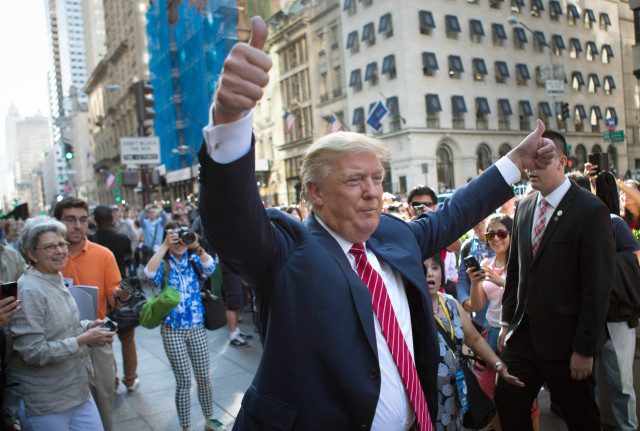By Barbara Slavin
At a time when American leadership is already doubted by traditional U.S. allies in the Middle East, Donald Trump’s remark that he would bar all foreign Muslims from entering this country did serious new damage to U.S. national interests.
It is tempting to dismiss Trump as a narcissistic buffoon whose policy “ideas” have little chance of being implemented even if he were somehow to be elected president. But given the way U.S.

Republican presidential candidate Donald Trump waves to the crowd gathered in front of Trump Tower ahead of the arrival of the pope’s motorcade for an appearance in New York’s Central Park. September 24, 2015 (AP)
campaign rhetoric plays abroad in an era of instant communication and social media, Trump’s irresponsible remarks only poured gasoline on the flames of ingrained anti-U.S. sentiments.
The litany of Muslim grievances against America is long and replete with conspiracy theories that may seem far-fetched but make sense to people struggling with civil war, sectarian division and poor governance.
Many foreign Muslims – and others — believe that the U.S. is in part responsible for the rise of extremist groups such as the organization that calls itself the Islamic State (IS) and is using IS as an excuse to remain militarily involved in Syria and Iraq.
Sunni Arabs generally fault Washington for overthrowing the Sunni leader of Iraq, Saddam Hussein, but failing to intervene decisively against Syrian dictator Bashar al-Assad, an ally of Shiite Iran. Many Sunnis also regard the recently signed nuclear deal between a U.S.-led consortium and Iran as further evidence of an American tilt toward Tehran.
Throughout the Muslim world, there has been a sense that the U.S. regards the lives of Muslims as worth less than those of Christians and Jews, as well as long-time resentment of unquestioning U.S. support for Israel over the Palestinians.
Trump’s call for “a total and complete shutdown of Muslims” entering the U.S. “only accentuates what they [Muslims] believe,” Nawaf Obaid, a Saudi citizen and visiting fellow at Harvard’s Belfer Center for Science and International Affairs, told an audience at the Atlantic Council think tank on Tuesday. “It’s very destructive [and] we’re going to be hearing about this for years to come.”
A recent poll of six Arab countries plus Iran and Turkey by Zogby Research Services showed that the only topic on which these Muslim powers agreed was that the U.S. role in “combating extremist sectarian violence” is negative. For the leading candidate in a major U.S. political party to paint all Muslims as potential terrorists only reinforces that unfavorable view.
“Forget the fact that this campaign plays out on a world stage in which everything is heard,” Jim Zogby, president of the Arab-American Institute, told this reporter. “To rail against extremism and go on about Muslims hating us only to make comments suggesting we hate Muslims is bewildering. The damage it does is incalculable.”
Trump’s remark is also completely counterproductive from the vantage point of counter-terrorism. As President Barack Obama made plain in a speech to the nation on Sunday – and House Speaker Paul Ryan reiterated on Tuesday — the Muslim community is an essential partner in identifying extremists such as the couple that killed 14 people in San Bernardino, Calif. last week.
Trump’s plan would probably have failed to prevent the massacre given that one of the shooters was a native-born American and the guns used in the attacks were legally obtained. His proposal is impractical and raises constitutional questions. Still, the damage it has done should not be underestimated.
One can only imagine the cries of celebration from the leaders of IS, al-Qaeda and other extremist groups as they watch the video in which Trump – to the cheers of a crowd in South Carolina – announces his new position. It’s hard to imagine a better tool to recruit new followers to the cause of violent jihad.
Bigotry and xenophobia are not new phenomena in the U.S. Irish, Italians, Jews and Asians have all faced resistance to immigration at various times only to blend into the American melting pot. Prejudice against Muslims began to grow after the Sept. 11, 2001 attacks and reignited with the emergence of al-Qaeda in Iraq and IS. American demagogues have contributed to this trend since the election of Obama, hinting falsely that he is a “closet” Muslim born in Kenya. Trump, who loudly questioned Obama’s birthplace, has now made this prejudice mainstream.
For his base of angry, alienated and predominantly older, white male voters, seemingly nothing the New York real estate magnate says is disqualifying. His statement about Muslims follows comments denigrating Mexicans, women, African-Americans, gays, disabled people and U.S. prisoners of war.
Incredibly, he still leads the polls for the Republican nomination and two-thirds of his followers say they would vote for him if he fails to get the nomination and runs as an independent.
Fortunately, social media – which has eagerly devoured Trumpisms – has produced a counter-reaction. For hours on Tuesday, the top trending topic was the hashtag #TrumpIsDisqualifiedParty.
But that does not diminish the harm Trump has done in a region already primed to question U.S. leadership.
Trump’s remarks were “extremely corrosive,” said Barry Pavel, director of the Brent Scowcroft Center on International Security at the Atlantic Council. His comments “contribute to a perception of an erosion of the U.S. role as a model” for Muslim societies, Pavel added. “We’re operating from a very significant deficit now and we really need to start digging out of the hole and not digging deeper.”

